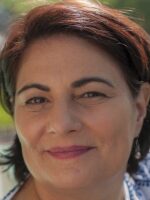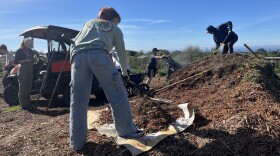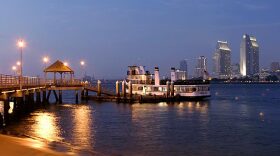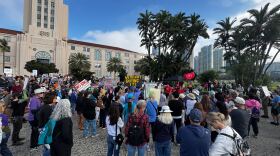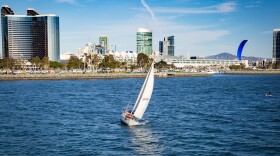Although thousands of miles from ground zero, San Diego's Muslim community drew attention after Sept. 11, 2001. Two of the hijackers lived there. They also prayed at a local mosque, where noted radical imam Anwar al-Awlaki preached. Recently, several men from the Somali community were arrested and charged with aiding a terrorist group.
A local imam has been working to open dialogue between Muslims and the larger community in part to combat the suspicion that arose after the local ties came to light.
Imam Taha Hassane arrived in the U.S. in August 2001, three weeks before Sept. 11. He has a wide smile and a warm manner. Hassane says he didn't get to experience much of pre-Sept. 11 America, but back then he could tell something was missing. He says his Muslim community was insular, separate from the larger society.
"We have failed to identify ourselves, to introduce ourselves to our neighbors," he says. "We have failed to build strong bridges of understanding and respect."
Those bridges were especially tested in San Diego. Within days of the attacks, news broke that two of the hijackers had lived and taken flight training in the city. Scrutiny of area Muslims intensified. Many withdrew.
Reaching Out To Neighbors
When Hassane came to head the Islamic Center of San Diego, he decided to make a change. He began hosting interfaith meetings and participated in community groups.
His wife, Lallia Allali, leads a local Girl Scout chapter, Troop 3120. The girls, just a few old enough to wear headscarves, earn colorful patches for Ramadan and henna art. They sew them on their sashes next to badges for cookie sales and friendship.
On one of the last nights of the Islamic holy month of Ramadan, the girls invited neighbors to break the fast with them. As the sun set and the prayers finished, trays of food came out. There was Afghan rice, Algerian stew, Egyptian falafel and sweet Syrian desserts.
Nannie Osawa attended the dinner. Her daughter, Jonette, converted to Islam 12 years ago and is a member of the mosque. She wears conservative Muslim dress and a headscarf. Jonette Osawa says she has always felt comfortable practicing her faith in San Diego.
Her mother scoffs and asks about comments people make at the mall or the market.
"Behind her or in front of her, I can hear people saying stuff not knowing that I'm her mother," Nannie Osawa says. "I think I saw it after 9/11 more so. I don't think people paid as much attention when she first started off."
Jonette Osawa says it's possible her mother saw it more; she doesn't pay attention, she says.
Federal Authorities After Sept. 11
Jonette Osawa doesn't like to remember the months after Sept. 11. They were difficult. She says her husband, also a convert, had to hire an attorney to get off an FBI watch list. Both she and her husband prayed at a San Diego-area mosque frequented by the two hijackers.
Local attorney Randall Hamud sat in on many interviews of San Diego Muslims at the local FBI office.
"The Muslim community in San Diego was terrorized because [of] the two hijackers that visited here in the year 2000," he says.
Hamud, whose parents immigrated to Southern California from Lebanon, came under fire himself for such outspoken statements.
"Federal authorities were convinced that somebody in San Diego must have helped them or somebody in San Diego must know something — and there was none of that," he says.
Hamud says he received several death threats.
He represented three men jailed as material witnesses in the Sept. 11 investigation. All three were released, though one of the men was deported.
Signs Of Change
These days though Hamud's practice is back to dealing mostly with civil matters. He says the community is thriving.
"I've seen the Muslim community grow, become less insular, more proactive with the local communities," Hamud says, "and I think that's a good thing."
Back at the mosque at the Girl Scout's Ramadan meal, only about 10 people from the neighborhood came. Allali, the imam's wife, isn't discouraged by the low turnout. She says she'll just keep opening the doors to the mosque.
"If the people know about who are Muslims and know about Islam, I can swear that everything will be fine in America," Allali says.
Next Ramadan, she says she's sure more of her neighbors will come.
Copyright 2022 NPR. To see more, visit https://www.npr.org. 9(MDAzMjM2NDYzMDEyMzc1Njk5NjAxNzY3OQ001))



